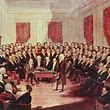
Constitution of Virginia
by James C. Sherlock
We have in this series explored the case In Re: Final Determination of the Office of Attorney General Division of Human Rights in DHR Case No.: 19-2652, NAACP Loudoun Branch v. Loudoun County Public Schools (LCPS).
This non-judicial investigation and determination has made famous:
- the new law, Subdivision B 2 of § 2.2-520 of the Code of Virginia that established in 2020 the Department of Law (AG’s office) Division of Human Rights (the Division);
- the Virginia Human Rights Act, Virginia Code § 2.2-2900 et seq and Virginia Code § 2.2-520 et seq (The Act) that Herring’s new Division of Human Rights cited in this finding; and
- the regulations written by the Division’s itself to guide its actions and the compliance of wrongdoers.
The determination was a result of a formal investigation that admitted evidence, including six and 1/2 pages of hearsay, that no court would have considered.
It measured the discriminatory impact on Black/African-American and Latinx/Hispanic students who applied and were accepted to Loudoun Academies by means of a racial statistical analysis of the student body.
It found that while the policies used by LCPS for application and acceptance to Loudoun Academies were neutral, the effects of those policies were discriminatory.
From those statistical results it found that even with the extraordinary affirmative steps by LCPS to recruit and train minority students to prepare them to compete for a seat in Loudoun Academies and blind selection procedures, LCPS failed to remedy the racial imbalance in Loudoun Academies.
It was made crystal clear that this is a numbers game. Failure to achieve the numbers means failure to comply.
From this mix of “evidence,” the Division of Human Rights determined:
There is REASONABLE CAUSE to believe that Loudoun County Public Schools administration of the Academies of Loudoun program had a discriminatory impact on Black/African American and Latinx/Hispanic students who applied (to Loudoun Academies)….
Immediately following the words above, the DETERMINATION requested that LCPS take actions in reference to regulations written by the new Division itself found in VAC 45-20-100 of the Regulations of the Division of Human Rights.
Integral to the Division’s DETERMINATION was NAACP Loudoun Branch’s Conciliation Request reviewed in Part II of this series of essays.
Then came the Division’s Request for Assurance of Compliance.
Summarized, it included:
- Within 60 days, LCPS will partner with … the NAACP Loudoun Branch to develop policies and procedures to increase diversity of the applicant pool and the population of admitted students in gifted and talented education programs including Academies of Loudon (and various other programs) …
- Within 60 days, LCPS will submit revised and updated policies and practices ensuring non-discrimination in student discipline. This again requires statistical equality.
- Within 60 days submit for the Division’s review revised and updates policies and practices … governing racial, national origin and religious-based discrimination and harassment.
- … submit for Division’s review revised and undated EEO policies and practices. …
- During the two-year period that follows the execution of the Letter Agreement and at its own expense, LCPS will Identify for Division review and approval a third-party consultant to assist LCPS in monitoring, assessing and making recommendations relating to the obligations in Paragraph 3, 4 , 5 and 6 (above) of this Letter Agreement.
Constitutional questions
Lawyers for Loudoun County should consider whether the requirements in the constitutions of Virginia and the United States for due process and separation of powers have been violated by Virginia’s new law designating a division of the executive department as a quasi-judicial agency. That agency is empowered to investigate, rule and levy penalties in matters of law.
Those same lawyers should consider whether statistical inequality in a competitive program based on demographics, the only evidence reported by the determination that is not hearsay, is sufficient to find civil rights have been violated.
The majority of the Supreme Court in Regents of the University of California v. Bakke in a fractured decision with six separate opinions agreed that the university’s use of strict racial quotas was unconstitutional.
Yet the Division’s determination unmistakably requires strict racial quotas.
Finally, the Division published in its own determination the request by the NAACP that LCPS provide what can only be understood as a segregated public charter school. Is Brown moot here?
These are just the questions of a layman, but it is crucial that the citizens of Virginia know whether this entire process is constitutional.


